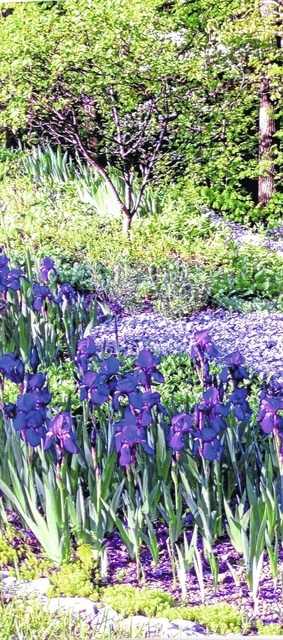
EATON — The National Wildlife Federation (NWF), America’s largest wildlife conservation and education organization, recently recognized Carol J. Becker of Eaton for successfully creating a Certified Wildlife Habitat through its Garden for Wildlife program.
NWF celebrates the efforts of Becker to create a garden space that improves habitat for birds, butterflies, frogs, and other wildlife by providing essential elements needed by all wildlife – natural food sources, clean water, cover and places to raise young.
Certification also makes the Certified Wildlife Habitat part of the Million Pollinator Garden Challenge, a national effort to restore critical habitat for pollinators.
“We are so excited to have another passionate wildlife gardener join us and create a Certified Wildlife Habitat. Over the last 40 years, nearly 200,000 wildlife gardeners have joined NWF’s Garden for Wildlife movement and helped restore wildlife habitat right in their own yards and neighborhoods,” said David Mizejewski, naturalist with the NWF. “ Whether you garden in a suburban yard, an apartment balcony or a 10-acre farm, a schoolyard or a business park, or anything inbetween, everyone can create a home for local wildlife. Turning your space into a Certified Wildlife Habitat is fun, easy, and makes a big difference in neighborhood wildlife.”
The Becker’s habitat is alive with squirrels, birds (including ducks, geese, and herons), chipmunks, toads, frogs, salamanders, turtles, fish, and butterflies. Most of the acreage is as nature intended but along the borders of the woods organically grown herbs and native plants are featured for the pollinators. Last year, the milkweed patch was expanded for the monarch butterflies.
“When we moved to Lakengren, we were blessed with almost an acre of old growth woods on the lake with a lot of character. My efforts are focused on controlling erosion, keeping the hillsides in bloom for the pollinators, protecting the wildflowers and the watershed. I enjoy being outside, watching the wildlife and gardening,” said Becker.
The NWF’s Garden for Wildlife program encourages responsible gardening that helps pollinators and other wildlife thrive. It encourages planting with native species like milkweed and discouraging chemical pesticide use. With nearly 200,000 locations and growing, NWF’s Certified Wildlife Habitats and Community Wildlife Habitats recognize individuals, schools, groups, and whole communities committed to providing habitat for wildlife, including pollinators. Each of the nearly 200,000 certified locations provides food, water, cover and places to raise young. This makes yards, schools, businesses, places of worship, campuses, parks, farms, and other community-based landscapes into wildlife sanctuaries. For more information on gardening for wildlife and details on how an entire community can become certified, visit www.nwf.org/habitat or call 1-800-822-9919.


